
Father Tosses Out All Of 26 Y.O. Daughter’s Food That He Decides To Be “Unsuitable” Bringing Her To Tears, So She Asks Him To Leave
Parents usually try to make sure their children eat enough healthy food to grow up healthy and well-developed. The way parents or caregivers do so can vary, as people have different approaches to food and they naturally pass on their own eating habits to their children. However, as children grow up, they sometimes find that certain things they were encouraged to follow are not in accordance with their preferences or maybe even harmful to their overall health. Unfortunately, some parents refuse to understand or at least respect the food choices of their children even as they grow up. This was exactly the experience of this Redditor, who got to the point where she had to take some pretty extreme measures to get her basic rights respected.
More info: Reddit | Dr. Sarah H. Ravin
This woman is finally in control of her ED and enjoys eating healthy, however, her father is determined to change that
Image credits: The Unwinder (not the actual photo)
While visiting his daughter for a week, the father threw away all of her healthy food and replaced it with junk food
Image credits: austere95
The woman burst into tears as she does not earn much and spends most of her money on food
Image credits: decar66 (not the actual photo)
Instead of apologizing, her father claimed she is not “in her right mind” and she should “stop being fussy and eat like a normal person”
The woman notes that she had certain eating disorders in the past, however now after meeting the right psychologist, she is able to keep her eating habits in balance. She shares that her kitchen is always full of vegetables, fruits, and sources of healthy fat like fish or poultry meat, as she tries to eat healthy and enjoys preparing meals for herself. She is also working on her attitude towards food, as she gets nervous eating unhealthy meals for too long.
The woman does not state whether the source of her eating disorder had something to do with her parents, however, seeing her father’s lack of respect and empathy might seem to suggest so. She shares that her parents being unable to understand that her eating disorder was a real problem was one of the main reasons she moved out as soon as she turned eighteen. Fortunately, her overall problematic relationship with her parents improved during the years she was living on her own.
Yet, it only took her father to come to visit her for a week, and a big part of the good work done on their relationship was reversed as the old issues re-emerged. Immediately upon the arrival of her father, there were certain signs of her father trying to force the old habits of eating “real” food on his daughter, which for him is deep-fried food with tons of salt or at least it has to be fast food. The woman falsely assumed they managed to come to an agreement, only to have her father prove her wrong, as he threw away all of her healthy food and replaced it with pre-cooked food, tons of red meat and sausages, a full bag of sweets and chips.
The intense situation reached its culmination when the woman burst into tears as she spends most of her money on food while her father, instead of apologizing, accused her of “still not being in her right mind” and claimed she “should stop being so fussy and eat like a normal person.” Being abused in her own house, the woman of course had no other way to protect her property, her basic rights, and her overall health than to kick her father out of her house. Which she did and which in turn led to an ultimatum from her parents to apologize if they are ever to talk to her again.
The woman carried the food her father bought, as well as his luggage, to the corridor and told him to get out of her house
Image credits: Yellowstone National Park (not the actual photo)
As a result, the woman received an ultimatum from her parents to apologize if she wishes to ever speak to them again
In order to better understand the situation, Bored Panda reached out to Dr. Sarah K. Ravin, a licensed psychologist, and trained scientist-practitioner, specializing in the treatment of children, adolescents, and college students with eating disorders, anxiety, depression, OCD, Body Dysmorphic Disorder, and self-injury.
We asked Dr. Ravin what is an eating disorder and she explained that: “An eating disorder is a biologically-based metabo-psychiatric illness that severely affects a person’s ability to self-regulate around food and often, though not always, impacts their body image and feelings about food and weight. Eating disorders can manifest with some or all of the following symptoms: food restriction, fasting, binge eating, purging, compulsive exercise, pronounced drive for thinness, irrational fear of weight gain, body dissatisfaction, body dysmorphia, or avoidance of food due to sensory issues.”
Believe it or not, while clinicians used to think that certain parenting styles caused or contributed to eating disorders, these hypotheses have been since debunked. Dr. Ravin elaborated that “the fact that a child has an eating disorder tells us nothing about the family in which they were raised. Children who develop eating disorders come from amazing families, horrible families, and everywhere in between.”
“Twin studies and adoption studies have demonstrated that the risk of developing an eating disorder is between 50%-80% genetic. The rest of the risk may come from a variety of factors, including but not limited to personality traits, traumatic experiences, puberty, dieting, medical illnesses, exposure to the thin ideal, pressure to maintain a thin appearance due to participation in certain activities, bullying, etc.”
We asked for some recommendations on how can parents promote a healthy relationship with food in their children and reduce the likelihood of developing eating disorders. Dr. Ravin explained that even though we do not know whether it is possible to reduce the likelihood of developing an eating disorder, we know that early intervention is key to a positive outcome. For this reason, Dr. Ravin advises that, “if parents suspect that their child is developing an eating disorder or showing signs of disordered eating, they should get their child evaluated by an eating disorder specialist ASAP. It is possible, at least in some cases, to prevent an acute, recent-onset eating disorder from becoming a chronic one.”
Additionally, irrespective of eating disorder prevention, Dr. Ravin distinguished the steps that parents can take in order to help their child develop a healthy relationship with food and these include:
– “Modeling an “all foods fit” mentality and refraining from passing judgment on certain foods. Foods should not be labeled as “unhealthy” or “junk” or “unclean.” Less nutritious foods (e.g., desserts) can be referred to as “treats,” which has a positive connotation.
– Eating family meals whenever possible. Providing structure around meals, such as eating meals and snacks at predictable times.
– Modeling a healthy relationship with food, which includes eating three balanced meals per day and not restricting any food groups unless there is an allergy or medical need.
– Refraining from making comments about size, weight, or body shape (their own, their child’s, or anyone else’s).
– Modeling a healthy relationship with movement and engaging the family in physical activities together (hiking, biking, swimming, snorkeling, tennis, etc.). Conceptualizing movement as something to be enjoyed as part of a healthy lifestyle rather than as a tool for weight loss or body shaping.”
Image credits: Amazing Almonds (not the actual photo)
Finally, we inquired how can an adult, who previously had an eating disorder, manage their relationship with their parents who refuse to respect their choice of healthy food and thus tend to create unhealthy tension in this sensitive area. Dr. Ravin answered that this is a tricky question because “it all depends on the nature of the “healthy food choices” and the nature of the relationship between the adult and his parents.”
Dr. Ravin elaborated on her answer, “My first question would be, is the adult truly eating in a healthy way or is his idea of health really about dietary restriction, a residual eating disorder symptom? Research shows that eating a limited or restricted diet after recovery increases the likelihood of relapse. Perhaps the parents are trying to help their adult child expand their food variety so that they have a better chance of staying recovered?”
“On the other hand, perhaps the parents are dieting or restricting their food intake in some way (which would NOT be good for the individual with the eating disorder), and the adult child is wanting to practice balanced eating, enjoying all foods in moderation. In this case, the adult child is the one who is eating in a way that is truly healthy and conducive to recovery, whereas the parents are eating in a way that could trigger relapse in the adult child (but may be healthy for the parents, depending on their health issues).”
“If the adult child lives with his parents and the tension is interfering with his mental health, quality of life, or relationship with his parents, then I would recommend that the family meets with a therapist who specializes in eating disorders to help them navigate these conversations and boundaries around food.”
“If the adult child no longer lives with his parents, then it may be easier for him to establish these boundaries on his own. The adult child should check in with his therapist or dietitian to determine whether his eating behaviors are indeed healthy FOR HIM as someone in recovery from ED. If his behaviors are truly healthy for him, then he could use some support in setting boundaries with his parents around the topic of food.”
In order to find out more, please visit Dr. Sarah K. Ravin’s website and her blog on eating disorders, depression, anxiety, and psychotherapy.
Redditors backed the woman as her father had no right to throw away her food, in addition to sharing their own experiences with ED
120Kviews
Share on FacebookThere's actually another comment from OP where she knows the motivation behind his actions: "My dad has tons of issues but I have to admit he is able to cook his own meals and is cooking as often as my mum. It was more like "If I throw out her food she'll have no choice but to eat whatever I brought her."". In other words, he knew damn well what he was doing was controlling if not outright abusive. As another commentor puts it: "OP thinks this is a problem. This is not a problem. This is the opposite of a problem. The problem solved itself. Keep it that way."
ED needs to be taken absolutely seriously and this father is not doing that. If he wants to stuff his face full of unhealthy foods, then he should have just gone back home. He had absolutely no right to throw out this young woman's food because of his distorted beliefs on what is malnourished and what isn't. I am considered obese and yet I still have fruits and vegetables in my house. I like all kinds of fruits and vegetables and my favorite meat is chicken. These parents don't deserve an apology from the OP because she didn't do anything wrong. You don't go into someone else's house and start trying to change the rules. That is not right and the dad knew exactly what he was doing. If he didn't like what was in the house to eat, he could have gotten take out or something. Some people are just giant a-holes and will never change. She is certainly not the a-hole.
I completely agree. My heart aches for OP. I hope she doesn't drag herself back down worrying about her parents and trying to maintain contact with them. It's disgusting how ignorant they are being about her ED and how they're treating her, but I guess they have to remain that indignant and deluded so they can live their lifestyle unapologetically. I hope OP cuts out the negativity from her life so she can continue to improve on her health and happiness.
Load More Replies...Threw away her food? I would have returned his new food to the store for store credit and rebought what he threw out
Exactly, how bizarre to think you can just go to someones home and dispose of their food. I think in that situation I would demand either money back or make him repurchase what was thrown away. Don't care if that's my dad or Jesus himself.
Load More Replies...There's actually another comment from OP where she knows the motivation behind his actions: "My dad has tons of issues but I have to admit he is able to cook his own meals and is cooking as often as my mum. It was more like "If I throw out her food she'll have no choice but to eat whatever I brought her."". In other words, he knew damn well what he was doing was controlling if not outright abusive. As another commentor puts it: "OP thinks this is a problem. This is not a problem. This is the opposite of a problem. The problem solved itself. Keep it that way."
ED needs to be taken absolutely seriously and this father is not doing that. If he wants to stuff his face full of unhealthy foods, then he should have just gone back home. He had absolutely no right to throw out this young woman's food because of his distorted beliefs on what is malnourished and what isn't. I am considered obese and yet I still have fruits and vegetables in my house. I like all kinds of fruits and vegetables and my favorite meat is chicken. These parents don't deserve an apology from the OP because she didn't do anything wrong. You don't go into someone else's house and start trying to change the rules. That is not right and the dad knew exactly what he was doing. If he didn't like what was in the house to eat, he could have gotten take out or something. Some people are just giant a-holes and will never change. She is certainly not the a-hole.
I completely agree. My heart aches for OP. I hope she doesn't drag herself back down worrying about her parents and trying to maintain contact with them. It's disgusting how ignorant they are being about her ED and how they're treating her, but I guess they have to remain that indignant and deluded so they can live their lifestyle unapologetically. I hope OP cuts out the negativity from her life so she can continue to improve on her health and happiness.
Load More Replies...Threw away her food? I would have returned his new food to the store for store credit and rebought what he threw out
Exactly, how bizarre to think you can just go to someones home and dispose of their food. I think in that situation I would demand either money back or make him repurchase what was thrown away. Don't care if that's my dad or Jesus himself.
Load More Replies...
 Dark Mode
Dark Mode 

 No fees, cancel anytime
No fees, cancel anytime 



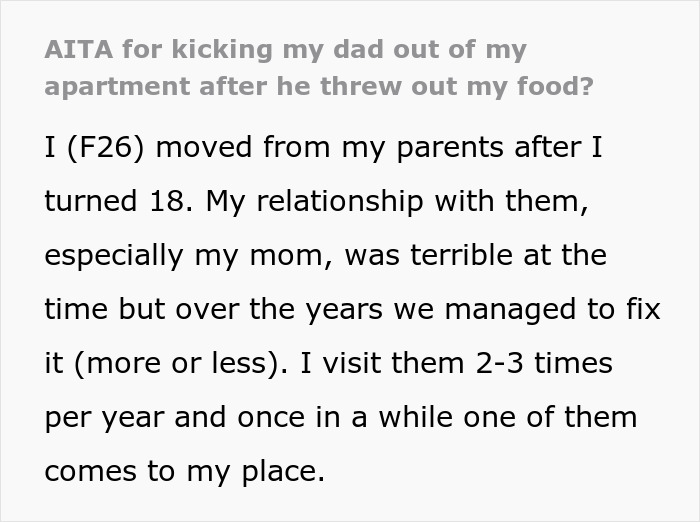

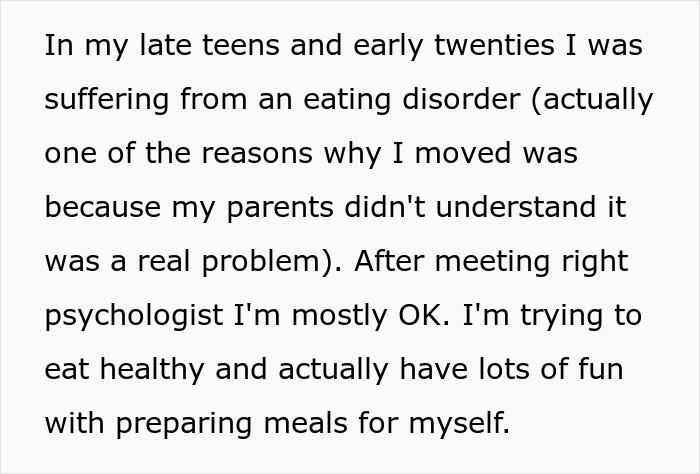
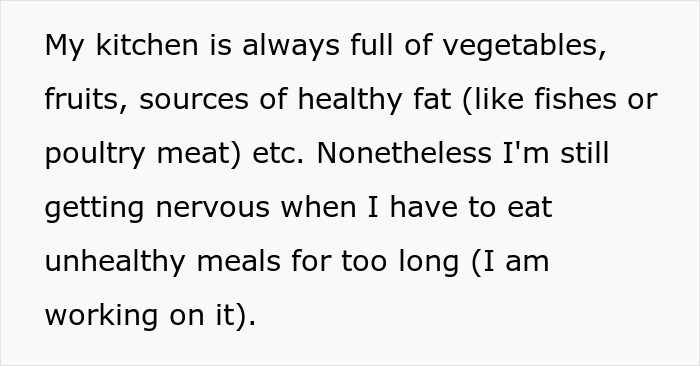

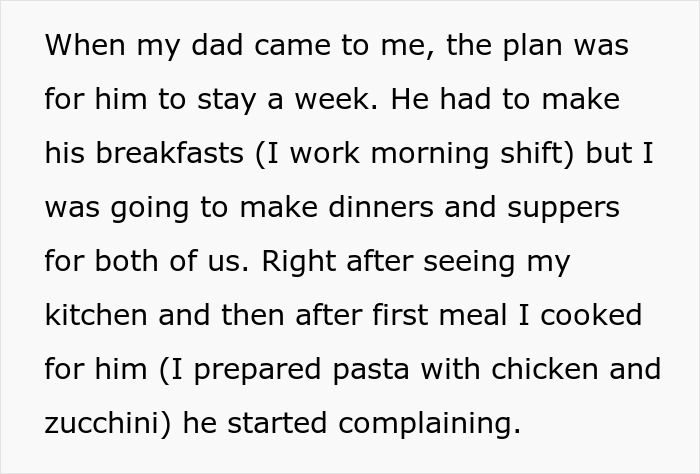
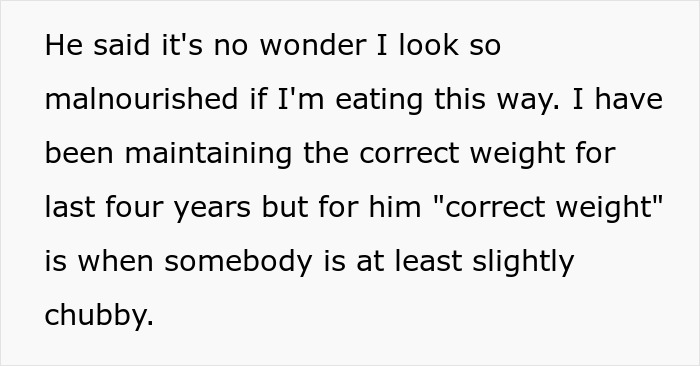
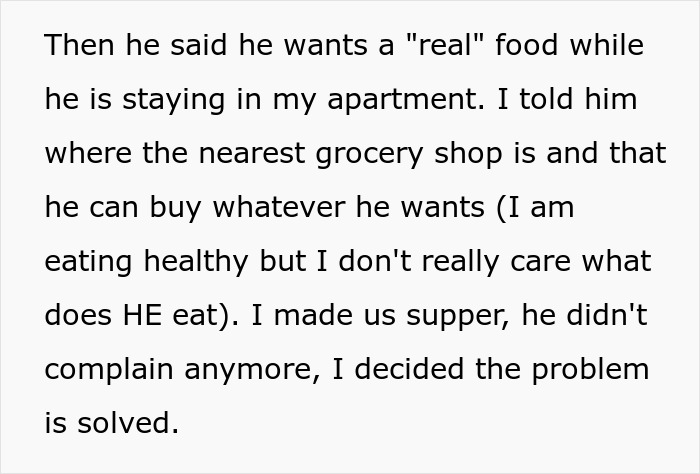


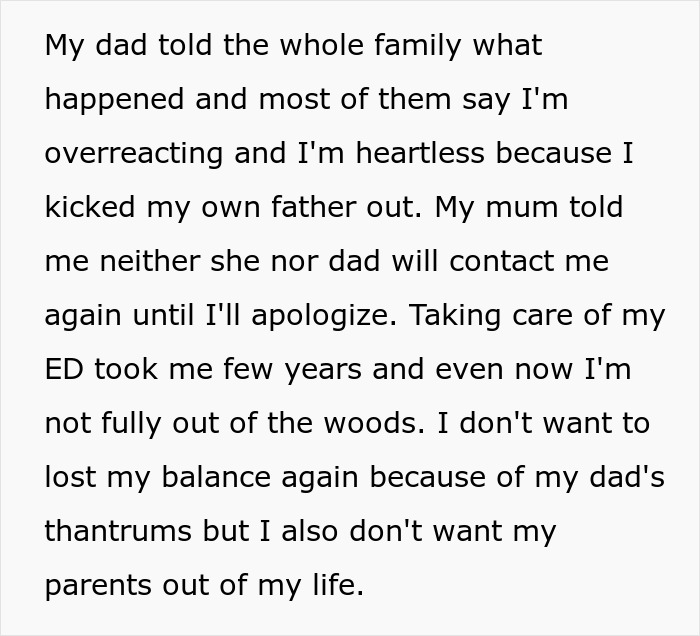




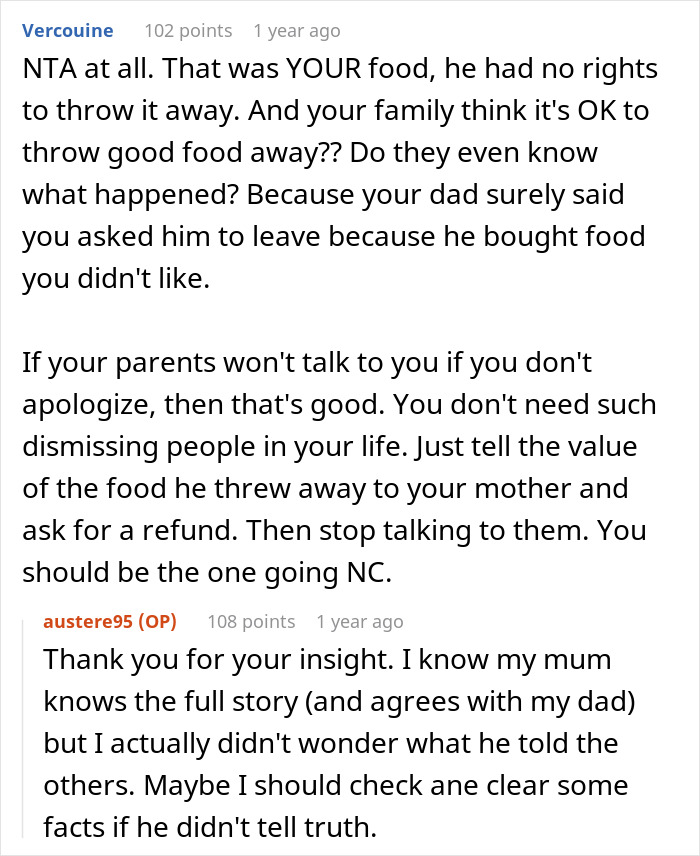
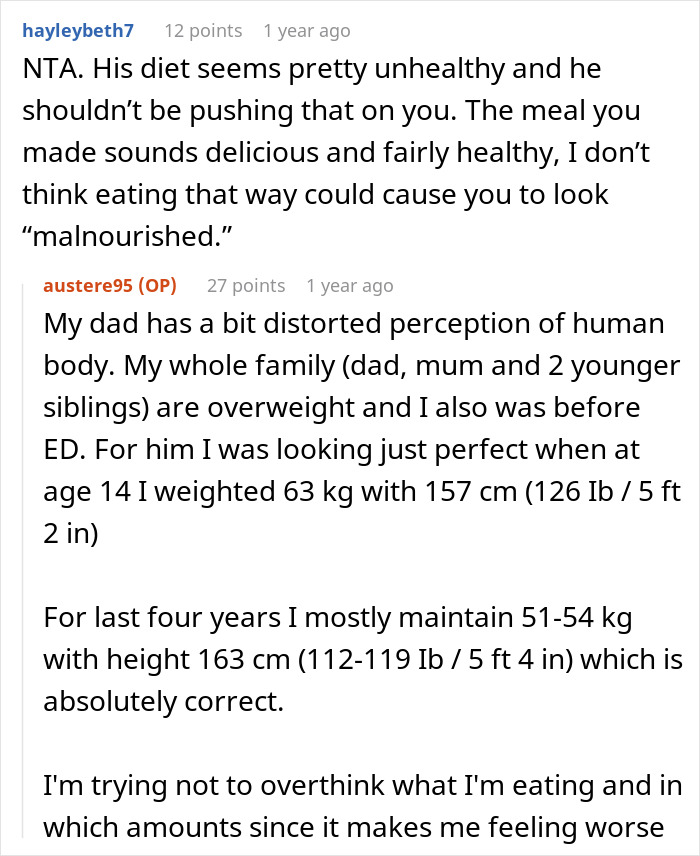
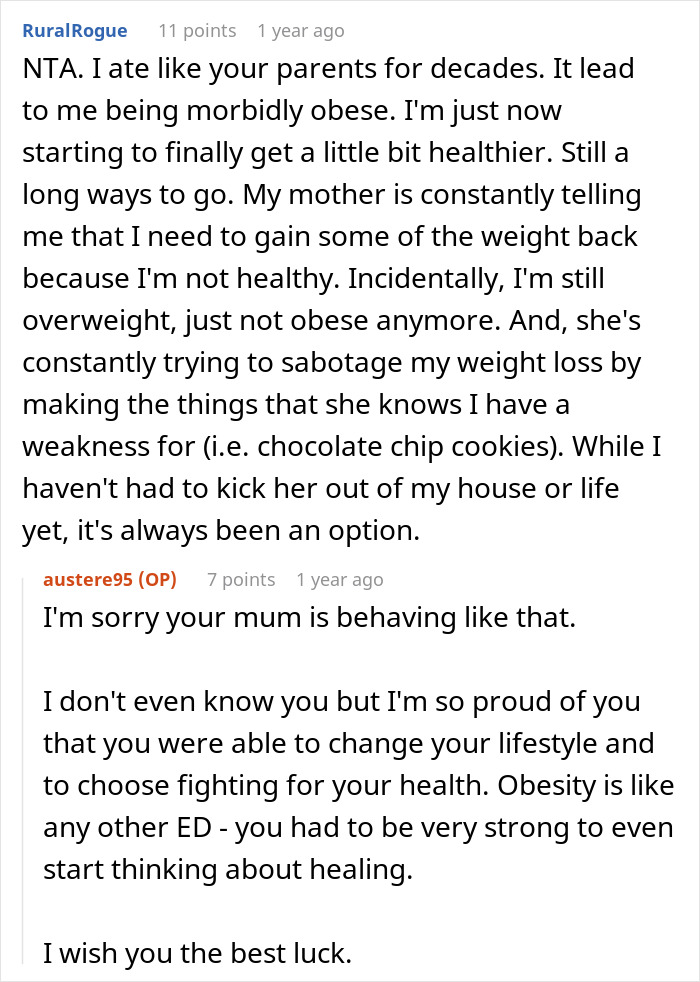

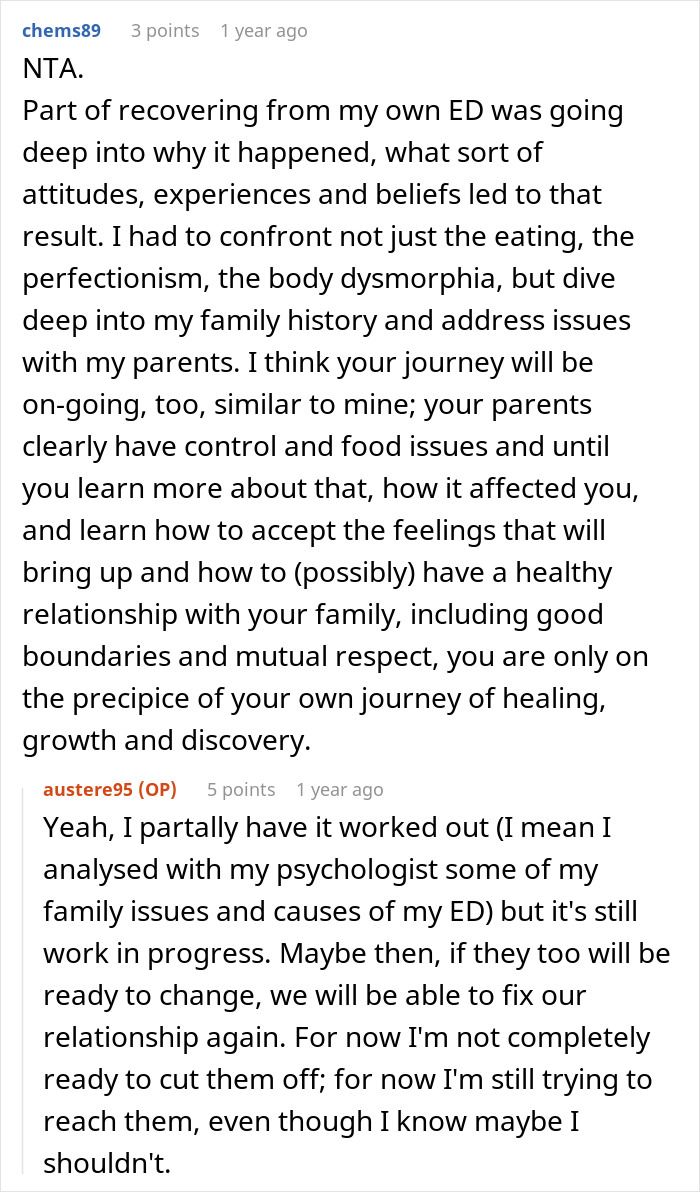
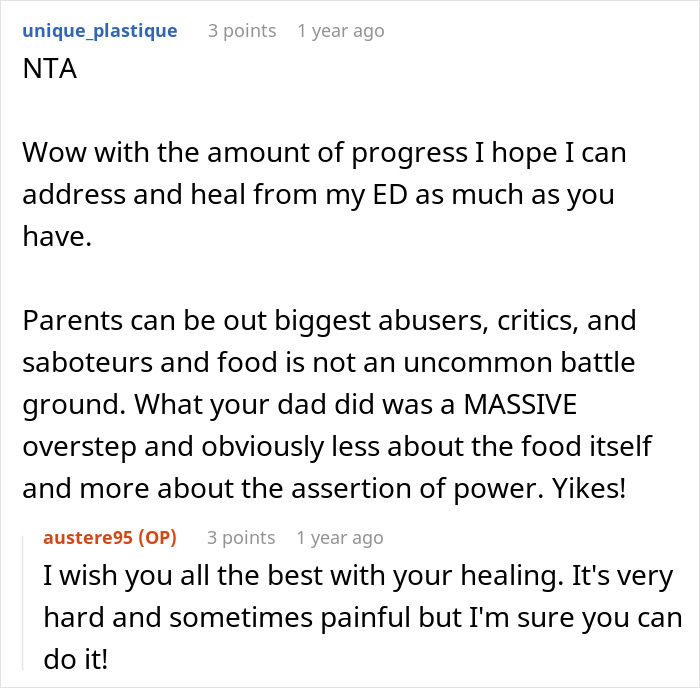
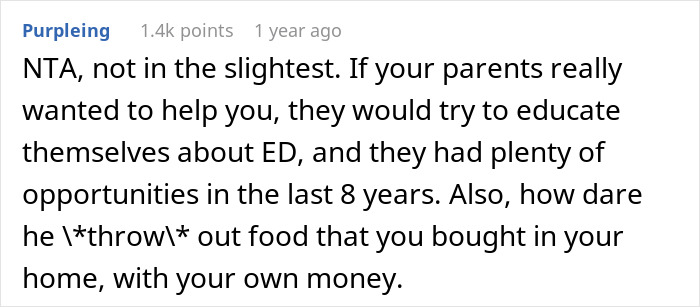
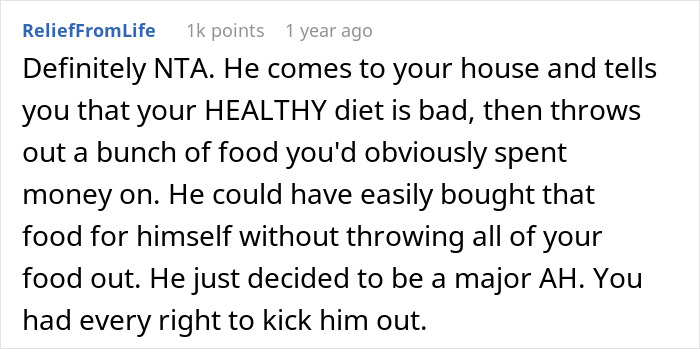
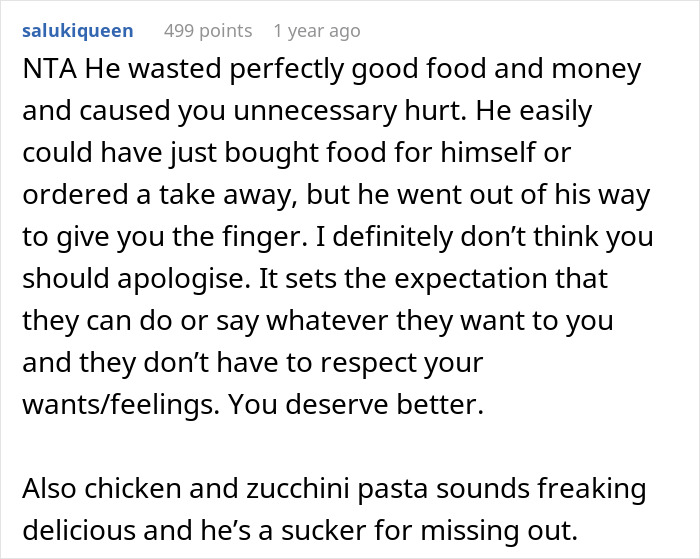







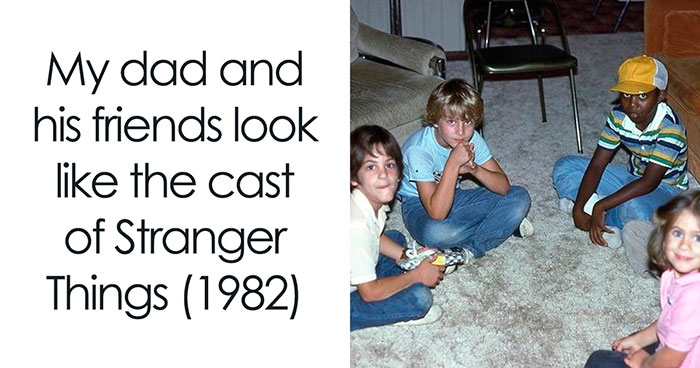



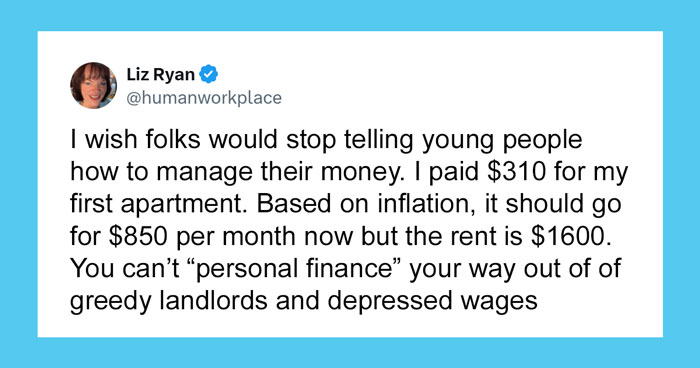



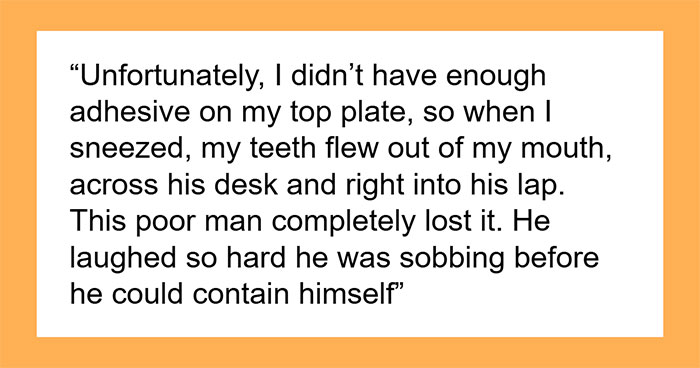










94
39